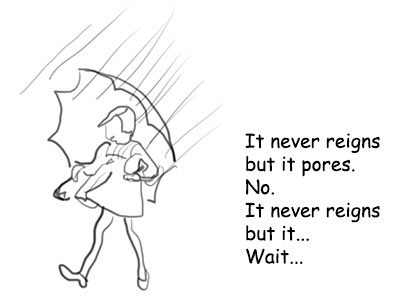
Welcome back to our occasional series looking at what happens when you’ve got a language with hundreds of thousands of individual words. Estimates vary, but the Collins English Dictionary puts it at around three-quarters of a million with only forty-four distinct mouth-sounds with which to render them all.
(Spoiler: Sometimes unrelated words end up with similar pronunciations or spellings, and people get them mixed up, a lot.)
Get a free sample proofread and edit for your English document.
Two professional proofreaders will proofread and edit your English document.
Rein vs. Reign vs. Rain.
Looking at this trio of words in isolation, few people would confuse their meanings. The first, usually plural when used as a noun, belongs to the specialized vocabulary of horsemanship; the reins are a pair of straps held by the rider and used to direct the movement of the horse. The word is also used as a verb for the act of using the reins, particularly to slow or halt a running horse.
Ex: The jockey held fast to the reins.
Ex: The messenger reined her horse to a stop.
“Reign” with a “g” is a verb describing a monarch’s rule of a country or tribe; it derives from a proto-Indo-European word meaning “to move or lead in a straight line,” and it’s a cognate with the Latin rex, meaning “king.” In noun form, it’s the period of time during which the monarch rules. As both noun and verb, “reign” is often applied metaphorically to management or control even outside a literal monarchy.
Ex: Margrethe II is the reigning Queen of Denmark.
Ex: J. Edgar Hoover’s reign over the FBI lasted from 1948 to 1972.
Given their radically different meanings, it seems unlikely that anyone would get these homophones mixed up. But in idiomatic use, their meanings overlap confusingly. “Rein” and “reign” both have connotations of mastery and dominance: the former over a horse, the latter over an entire nation. When we talk about exerting control over someone or something, especially one’s own emotions, we might use the idioms “rein in” or “keep a tight rein on.”
The metaphor is obvious. We are conceptualizing the object of control as a powerful beast that could easily run amuck without a firm guiding hand, but it’s also unspoken that we do not say “Your anger is a wild stallion, and you must rein it in,” but simply, “Rein in your anger.”
Substituting “reign” in the idiom almost makes sense, because it connotes control in a literal sense, being the monarch of another person or master of one’s own emotional domain, whereas “rein” is a poetic allusion. But poetic or not, “rein in” is the established idiom, and is considered correct by virtue of long usage.

The telling detail is the preposition that accompanies the verb. “Rein in” literally refers to the rider holding the reins close to their own body, the better to control the horse. Similarly, “keep a tight rein on” refers both to the tightness of the rider’s grip on the strap and on the tension of the strap pulling on the animal; it’s equivalent to “keep (someone) on a short leash.” Reign with a “g,” by contrast, uses the preposition “over” to describe the relationship between monarch and subject.
(“Rain” is both noun and verb for precipitation of water droplets from a cloudy sky, and I mention it here mostly in relation to the classic rock song “Love, Reign o’er Me,” the closing track of the Who’s 1973 album Quadrophenia. In the lyrics, songwriter Pete Townshend willfully courts confusion by mixing his metaphors, casting love as both an overwhelming force to which the narrator yearns to submit and as a cooling rain which can slake his thirst. This has led some listeners to, quite understandably, mishear the title as “Love, Rain o’er Me,” and as an old Who fan I feel compelled to interrupt my own blog, if only for a paragraph, to set the record straight. I thank you for your kind indulgence.)
Pour vs. Pore
This talk of rain brings us to another perplexing pair. “Pour” with a “u” describes the gravity-powered flow of some fluid, either a liquid or a loose, granular solid like table salt, from a higher point to a lower one, often (but not always) into or out of a container of some kind. The word’s origin is uncertain, but it may come from an Old French word for sifting grain.
Ex: Dwayne poured syrup onto his pancakes.
Ex: Hickman’s Creek pours over a waterfall into the pool below.
Ex: The Highway Department is pouring concrete for a new sidewalk.
The homophonic verb “pore” with an E is also of unknown origin, but may derive from the Old English “spyrian,” meaning to ask about or investigate, making it distantly related to our modern word “spy.” (Note that the verb is completely unrelated to the noun “pore” or the adjective “porous,” which can be traced directly back to the ancient Greek “poros,” meaning a hole or passageway.) As its etymology suggests, “pore” in the modern sense means to examine something, often a document, with painstaking attention. And like “reign,” it is generally accompanied by the preposition “over.”
Ex: Sandra watched her lawyer pore over the contract, looking for loopholes.
“Pour over (a document)” is a very common error, probably because “pour” is a commonly used word in other contexts while “pore” as a verb is specialized and obscure. If you’re stuck as to which to use, let the –re in “pore” remind you of “research,” which often involves close reading of printed materials.
We end this blog by noting the ascension of King Charles III to the British throne, and by wishing him luck as head of state, a job that entails a great deal of paperwork, which His Majesty will no doubt be scrutinizing closely. Long may he reign, and long may he pore!
Jack F.
Get a free sample proofread and edit for your English document.
Two professional proofreaders will proofread and edit your English document.
Get a free sample proofread and edit for your document.
Two professional proofreaders will proofread and edit your document.
We will get your free sample back in three to six hours!